What does you na ような mean in Japanese?
Most likely, it means to be similar, as in "an X that is like an Y," or "an X that is like of an Y;" or it being "like," "as if," something had happened; or to say someone or something is "the sort" of person/thing that would do something. Sometimes it's found at the end of an incomplete sentence where ki ga suru 気がする is omitted, in which case it would mean "[I] have the impression that." Syntactically, this is you 様 followed by the na な copula. It could also be the end of the volitional form followed by a na な particle, in which case it means "let's do X, shall we?"
- {taiyou no you na} hito da
太陽のような人だ
[He] is a person [that] {is like the sun}.
[He] is a sun-like person. - {neko no you na} mimi
猫のような耳
?Ears [that] {are like cats}. (unlikely.)
Ears [that] {are like of cats}. (likely.)
Cat-like ears. - {omise no you na} ryouri wa tsukurenai
お店のような料理は作れない
[I] can't make food {like of the store}.
I can't make food like the food a restaurant makes. - {{yuurei demo mita ka no} you na} kao
幽霊でも見たかのような顔
A face {like {[he] saw a ghost [or something like that]}}.
[He was making] a face like he had seen a ghost. - {{uso wo tsuku} you na} hito janai
嘘をつくような人じゃない
[He] isn't a person {the sort [that] {spews lies}}.
He isn't the sort of person that lies. - {{doko ka de mita} you na}...
どこかで見たような・・・
- {{doko ka de mita} you na} ki ga suru
どこかで見たような気がする
?[I] got a feeling {as if {[I] saw [it] somewhere}}. (literally.)
[I] have the impression that {{[I] saw [it] somewhere [before}}.
I feel like I have seen it before somewhere. (in the sense of "I'm not sure but that's the feeling that I got.")
- {{doko ka de mita} you na} ki ga suru
- benkyou shiyou na
勉強しような
Let's study, shall we?
Let's study, alright?
Manga: Nichijou 日常
Manga: Kimetsu no Yaiba 鬼滅の刃
Grammar
See the article about you 様 for details about the grammar. This article is only to list examples.
The phrase you da ようだ is the predicative form of you na (you desu ようです is the polite form of you da), while you ni ように is the adverbial form.
Examples
- Context: in a traditional JRPG setting, a hero had a party which included an elf. The elf outlived the hero, as elves live longer than human. She tells about what sort of person he was.
- {watashi to wa chigatte} {{hitasura ni} massugu de}, {{{komatte-iru} hito wo kesshite mi-sutenai} you na} ningen deshita.
私とは違ってひたすらにまっすぐで、困っている人を決して見捨てないような人間でした。
{Different from me}, {[he] was [{always} frank] and}, was a human {the sort [that] {wouldn't [abandon] someone {being troubled [by something]}}}.
Unlike me, he was the sort of person that would always help people in trouble.
- hitasura - having only one thing in mind.
- massugu - "completely direct," "completely straight (because a direct line is a straight one)," in the sense not masquerading their intentions or being roundabout about things, just straight going and helping people in this case and it being simply that and nothing more. Also used in the sense of being "honest" as not being "twisted," e.g. not living a criminal life, living a honest one.
- chigatte - te-form of chigau 違う.
- {{watashi dewanaku} kare ga iki-nokotte-ireba}, {ooku no mono wo sukueta} hazu desu.
私ではなく彼が生き残っていれば、多くのものを救えたはずです。
{If {not me but} he had survived}, [he] would have {been able to save many people}.
If he was alive instead of me, he would be able to save many people. (which I didn't saved because I'm not like him).- iki-nokoru - literally "to live and remain," to remain living after an event, to survive. May mean they survived a mortal danger or simply that they're still alive while others are not.
- sukueta - past form of potential form of sukuu 救う, "to save [people]."
- hazu - used to say what one concurs would be true, regardless of whether it's true or not. In this case, she concludes: "[he] could save a lot of people," ooku no mono wo sukueta. This is past-tensed because it's a counterfactual conditional: if he were alive, he could save people, but the facts are he isn't alive, therefore those people weren't saved.
- nan'nanda yo sono kao!!
何なんだよその顔!!
What's up with that face!! - yamero--------'!!
やめろーーーーっ!
Stop!! - nande sonna {{betsu no ikimono miru} you na} me de ore wo mite-n-da
何でそんな別の生き物見るような目で俺を見てんだ
Why are [you] looking at me with such eyes [that] {look like {[they] see a different species}}.
Why are you looking at me as if I'm a different creature. As if I'm not a human being like you.- See also: Eyes That Seem to be Looking at Garbage.
- Context: Satou Kazuma 佐藤和真 introduces his
haremparty. - haai, koitsu φ Akua
はーい、こいつアクア
Ookay, this [is] Aqua. - ore φ Kazuma
俺カズマ
Me, Kazuma. - kocchi φ Megumin
こっちめぐみん
Here, Megumin. - kore φ Dakunesu ne
これダクネスね
This thing [is] Darkness, okay. - Darkness ダクネス, who is a "masochist," do-M ドM, becomes overjoyed by the inhuman treatment.
- watashi wo "kore" yobawari
私を「これ」呼ばわり
[He] called me "this thing." - kore
これ
"This thing." - {marude mono no you na} atsukai
まるで物のような扱い
A treatment {like a thing}.
It's as if I was treated like a thing.
- Context: Aioi Yuuko 相生祐子 always does a tsukkomi (retort) when Minakami Mai 水上麻衣 does a boke (acts silly), however, feeling this isn't a proper relationship for two high school girls to have, Yuuko decides she won't do a tsukkomi anymore, no matter what happens, prompting Mai to do even stupider boke's, like coming to school wearing two glasses, and looking for her glasses on the floor as if she had lost them while still wearing both of them.
- nani kono {hai-peesu na} boke...
なにこのハイペースなボケ・・・
What is this {high-paced} boke... - marude {watashi no tsukkomi wo matteru} ka no you na......
まるで私のツッコミを待ってるかのような・・・・・・
It's as if {[she] is waiting for my tsukkomi}...... - dame! {tsukkondara} dame yo!!
ダメ!ツッコんだらだめよ!!
[Don't do it]! {If [you] make a retort} [you lose]!! - nanda yo, Minakami
なんだよ水上
[What's wrong], Minakami. - ni-ko mo megane shite-n-jan
2コもメガネしてんじゃん
You're wearing two glasses.- shite-n-jan - contraction of shite-iru no dewanai しているのではない.
- hahaha
ハハハ
*laughs* - Tanaka no yaroo!!!
田中のヤロー!!!
Tanaka, [you bastard]!!!- See also: cat eyes.
- watashi no tsukkomi wo......
私のツッコミを・・・・・・
My tsukkomi...... - {watashi dake ni yurusareta} saikou no tsukkomi wo!!!
私だけに許された最高のツッコミを!!!
The greatest tsukkomi [that] {was only allowed to me}!!! (literally.)
- In the sense of "only I, and not anyone else, was allowed to make a retort, how dare you take that from me!"
- boku'
ボクッ
*pencil snapping.* - ha'
はっ
Hah! (her snapping back from a moment of utter jealously.) - iya chigau chigau
いやちがうちがう
No, [that's wrong, that's wrong]. - watashi-n-janai
私んじゃない
[It] isn't mine.- Contraction of watashi no janai.
- sore wa watashi no tsukkomi janai kara!!
それは私のツッコミじゃないから!!
That's not my tsukkomi!!- In this scene, Yuuko resisted the urge to do an epic tsukkomi on Mai's boke, allowing Tanaka to do a pretty weak tsukkomi on it before her: "you're wearing two glasses, hahaha."
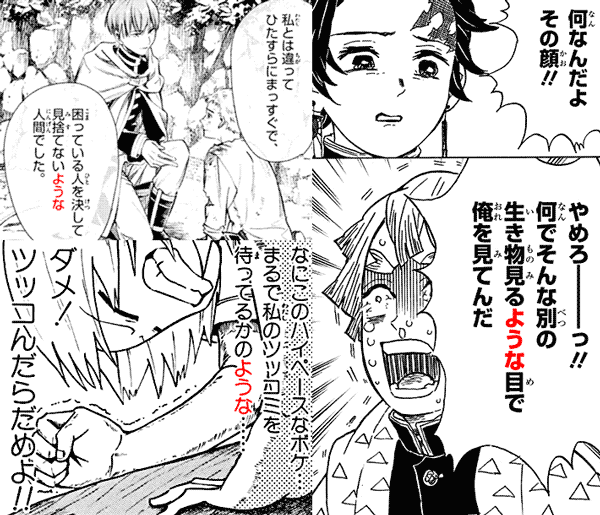
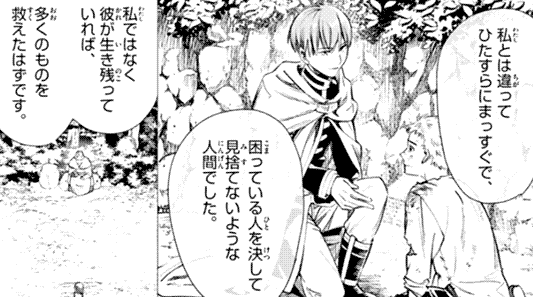
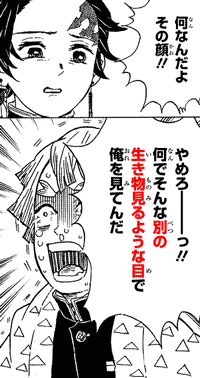
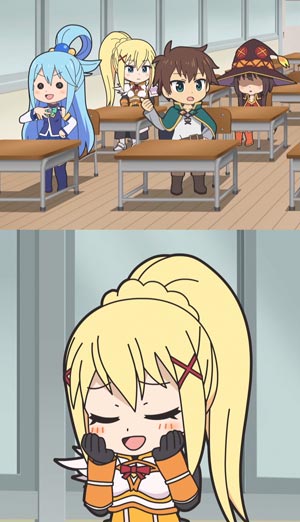
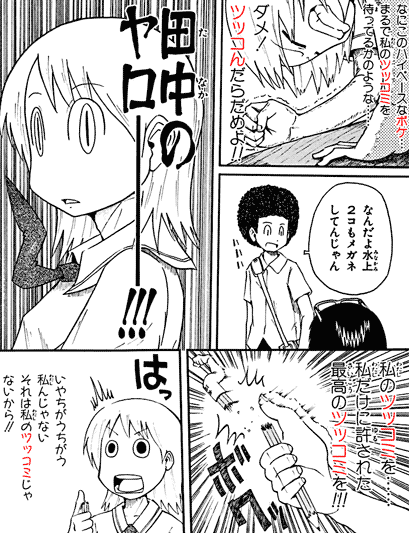
No comments: